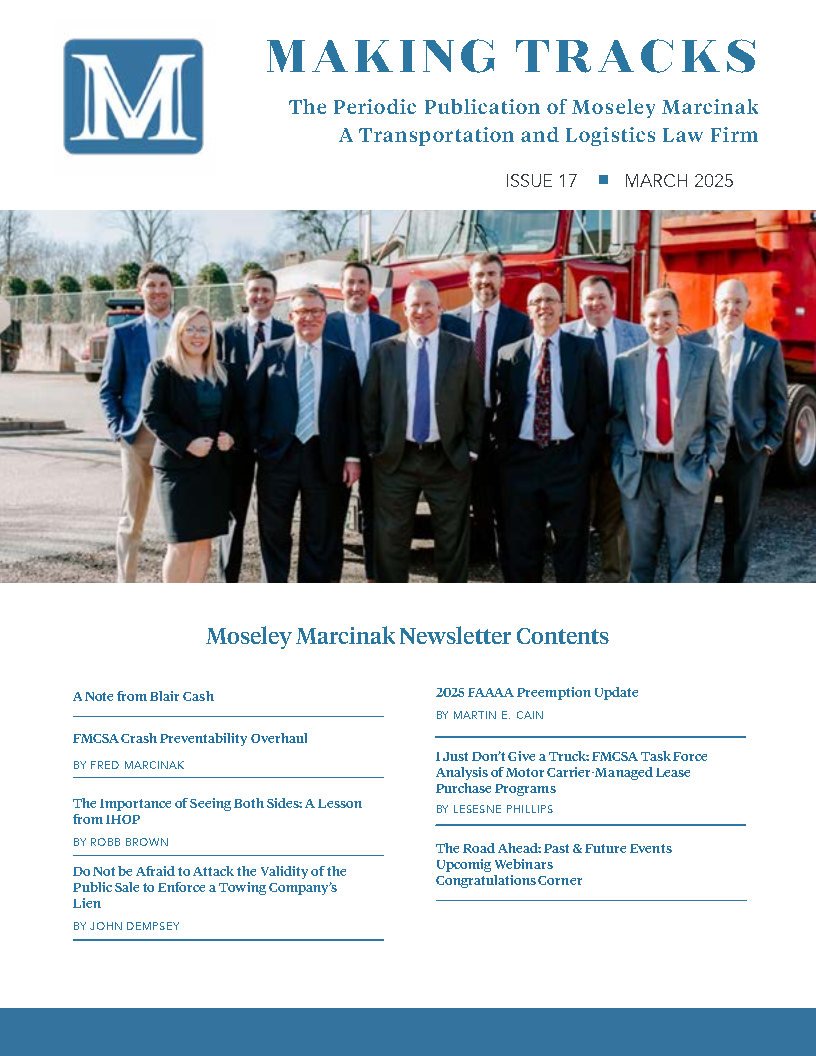There are currently 23 types of entities that are exempt from these reporting requirements, which includes banks, credit unions, and insurance companies. However, the exemption that will most likely provide exemption from the CTA reporting requirements for transportation companies are “large operating companies.” In order to qualify as a “large operating company” the company must have: (1) 20 full-time employees (definition of full-time employee is the same definition as used by the Internal Revenue Service); (2) have an operating presence in a physical office within the United States; and (3) have filed a U.S. federal income tax return for the previous year demonstrating more than $5 million in gross receipts or sales from U.S. Sources. Importantly, the CTA is a continuous reporting requirement, so if the company originally met this exemption and no longer meets the exemption, then the company must file the FinCEN report within 30 days of no longer being exempt. Additionally, if you file a report and information filed in the initial report changes, you will have 30 days from the change to file an updated report.
Information that must be reported to FinCEN includes the full legal name of the entity; any trade name used by the entity, current street address of the principal place of business; the jurisdiction in which the entity was formed; if a foreign company the U.S. jurisdiction where the company first registered; IRS Taxpayer Identification Number (EIN); and a list of the beneficial owners of the company. For new entities that are formed with a Secretary of State on or after January 1, 2024, the reporting company must list its “Company Applicant.” The “Company Applicant” is the individual who filed the formation documents with the Secretary of State or the individual who directed or controlled the filing of the formation documents with the Secretary of State. The list of beneficial owners is the only requirement that needs further explanation.
The CTA has defined a “Beneficial Owner” as any individual who meets at least one of two criteria: (1) exercising substantial control over the reporting company; or (2) owning or controlling at least 25% of the ownership interest of the reporting company. If an individual meets either of those criteria, they must be listed in the report to FinCEN. Under the CTA “substantial control” is defined as an individual that: (1) serves as a senior officer of the reporting company (for example, President, CEO, COO, CFO, or General Counsel); (2) maintains authority over the appointment or removal of a senior officer or a majority of the board of directors or managers for a limited liability company; (3) directs or has substantial influence over important decisions made by the reporting company. Important decisions of the reporting company can include the nature of the business, reorganization, merger, transfer of principal assets, major expenditures, termination of business lines, compensation for senior officers, entry into of significant contracts, or amendments to a company’s governance documents. This can include control over an intermediary entity that exercises substantial control over the reporting company. Next, for the 25% ownership interest, an “ownership interest” includes: any equity, stock, voting trust, capital or profit interest, a convertible instrument, put, call, option, or privilege of buying or selling an equity interest. The above requirements are not an exhaustive list but are only provided as examples of considerations for determining beneficial owners. Need for further review and interpretation will be required before determining whether an individual is in fact a beneficial owner.
Violations of these reporting requirements can apply to both entities and individuals. If an individual willfully reports false information or willfully fails to file a report with FinCEN, then that person could face individual liability. Additionally, if an individual is in substantial control of a reporting company that willfully files false information or willfully fails to report, that person may face individual liability.
It is important to note that access to the information filed in these reports will be restricted to U.S. Government Agencies engaged in national security, intelligence and law enforcement activity (both civil and criminal); Department of Treasury officials and employees in their course of official duties; State and Local law enforcement agencies in connection with civil or criminal investigations; financial institutions but only to assist with anti-money laundering compliance; and foreign agencies that request information through a U.S. federal agency and with which the United States has a treaty. Importantly, FinCEN has stated that the information reported will not be subject to FOIA requests. All reports will be filed online through FinCEN and at this time, they will not be accepting paper reports.
Although there are exemptions to these reporting requirements, it is important that all companies become familiar with this new form of compliance. This is a large deviation from previous requirements on entities that only needed to provide information to Secretaries of State in order to form new companies. Although entities remain creatures of State statute, these reporting requirements provide a federal element that will need to be addressed when forming new companies and for existing business owners. The lawyers at Moseley Marcinak Law Group are ready to help you with this compliance and can provide review of your operations in order to determine whether any exemptions exist for your business.
*****
Attorneys at Moseley Marcinak Law Group LLP have decades of experience representing trucking companies, brokers, logistics companies and insurers in disputes including freight claims, commercial transportation accidents, federal and state safety regulations, and insurance coverage disputes. For more information about the firm go to www.momarlaw.com.




















